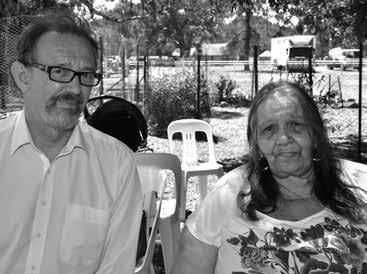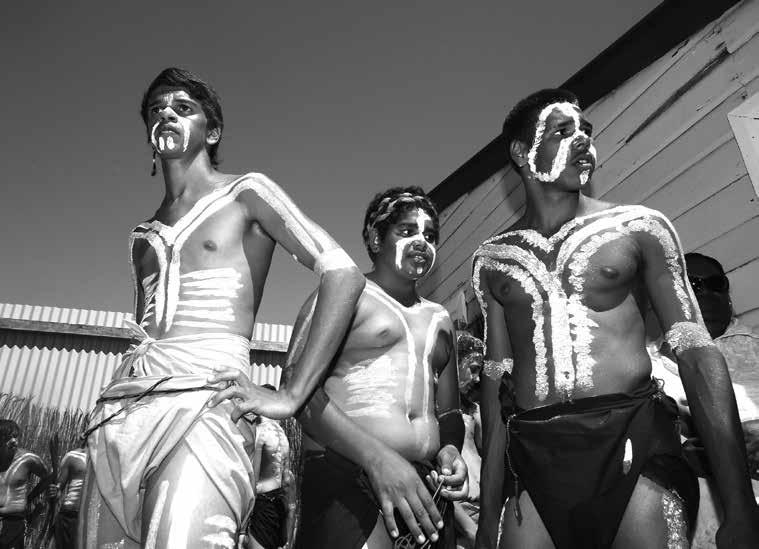
10 minute read
Inside: Recognition Relay takes to the road again
The Recognise relay has set off again on its epic journey across Australia, relaunching on Monday 10 March from Fremantle.
Hosted by Elders from the Whadjuk Noongar community, the traditional owners of the region, some 300 Fremantle locals turned out to welcome the Journey to Recognition and celebrate the opening of a new Aboriginal Cultural Centre in the city. Whadjuk Noongar Elder Cedric Jacobs gave a generous welcome to country at the Fremantle event and said: “I invite you on behalf of our Elders to walk with us, at our pace, in peace and unity, as it will align us with the soul and spirit of our land. For after all, this land’s resources have been managed in a sustainable way by my ancestors for 50,000 years.” The relay gives communities across the nation a chance to be part of the movement to recognise Aboriginal and Torres Strait Islander Australians in our country’s Constitution – and to remove race discrimination from it.
Advertisement
Noongar Elder Margaret Culbong of the Whadjuk tribal nation told the crowd that she particularly wanted to see constitutional recognition secured for future generations. “The Journey to Recognition is about empowering our young people, both black and white, it’s about working together to build a stronger, positive future for all in our country. Learning how we live together, accepting and acknowledging who we are, and respecting who we are,” she said. Her granddaughter, Tiana Culbong also addressed the crowd and said: “It is now 2014 – a time for change; a time to move forward as a nation united; a time to remove a constitutional silence; a time to recognise Aboriginal people and our history in this country.” “It is time to remove the divide between Aboriginal and non-Aboriginal people; a time to accept and acknowledge a shared history. By doing this, we can move forward together and share Australia’s future. I stand here to urge you to join the movement to make a change for a better future for us all.”
The Journey to Recognition began in Melbourne last May. Around 2000 people walked the first kilometre of the relay along the banks of the Yarra – led by AFL legend Michael Long, Aboriginal and Torres Strait Islander leaders and federal political figures from right across the party spectrum. Small relay teams of Recognise campaigners have since covered almost 16,000 kilometres by foot, bike, 4 wheel drive, kayak, surfboard and paddle board. They have visited more than 90 communities and had contact with more than 7500 Australians.
The Journey travelled through South Australia mid last year, with campaigners walking from Bordertown all the way to Adelaide on foot, then driving along the route of the seven sisters songline to Uluru, visiting communities in remote parts of the State.
When the relay arrived in Adelaide, Port Power became the first of the AFL clubs to throw its weight behind the Recognise movement with club greats Gavin Wanganeen, Byron Pickett, Chad Wingard and Jake Neade joining the journey in its walk through the Adelaide CBD amongst the big crowd that turned out that day.
Campaigners finished the last leg in Perth last December, when a crowd of 1500 was welcomed by Noongar Elder Len Collard and heard support for recognition from AFL legend David Wirrpanda and actor Ernie Dingo. From Fremantle, the Journey to Recognition will travel through the south-west of WA, stopping in Mandurah and the Roelands Village – once the site of the Roelands Mission – before walking from Bunbury to Augusta over 10 days. The WA leg of the Journey will end in Esperance, before campaigners head north to Queensland.
Locals are invited to community events in each town on the way. The re-launch of the Journey to Recognition coincided with the opening of the Fremantle Aboriginal Cultural Centre honouring the thousands of years of culture, tradition, knowledge and achievements of the Whadjuk Noongar people. To find out more visit www.recognise.org.au


Judgement disregards prior extinguishment on Yappala lands
On 19 February 2014, judgement was handed down by Justice John Mansfield in the Adnyamathanha Number 3 native title claim over Yappala, near Hawker in the Southern Flinders Ranges of South Australia.
His Honour confirmed that the purchase of the land by Indigenous Land Corporation (ILC) meant that prior extinguishment may be disregarded.
The claim area included perpetual leases and freehold lands. Such tenure typically extinguishes native title rights and interests as they comprise an exclusive grant of land title which is inconsistent with the exercise and enjoyment of native title rights and interests. The Court had to consider whether or not this extinguishment of native title could be disregarded given that the lands are now held for the benefit of Aboriginal people living in the area. Section 47A of the Native Title Act provides for historic extinguishment to be disregarded where the area is held expressly for the benefit of, or is held on trust, or reserved, expressly for the benefit of, Aboriginal peoples or Torres Strait Islanders.
This is a significant win paving the way for a future native title determination for the Adnyamathanha No 3 claimants. The case is also an important precedent which will influence the recognition of native title over many other ILC purchased properties in South Australia.
“Firstly I would like to thank everyone for coming here. But what I said then in language was, that a long time ago European people came to this country. They brought along jam, sugar, flour, and they gave it to my people. And my people thought that was great. It was a different taste but it was great. They hadn’t realized what was happening. “In 2009 we were successful at bush court at Nepabunna. That was a very special day. The people, my people were happy. And we are happy today. “Native title means that we can continue our traditional practices in peace. My culture is a vital part of everything I do. We Adnyamathanha people are lucky that our culture is still strong and our language still spoken fluently. “I have also made a commitment to sharing my culture not only with the younger generations of Adnyamathanha people but also members of the wider community,” he said. Adnyamathanha elder Geraldine Anderson, recalls the start of her people’s journey for native title recognition. “I remember when we first started fighting for native title. It was like a tree growing, and every time a new leaf would grow in one direction, we would be pulled in another.
“Now that we have our native title, I feel we have gained so much in our lifetime and we can enjoy our land without having to worry that someone might be looking over our shoulder. We can hunt for food and enjoy our land, and that is what native title is all about, our rights to use the land the way we always have,” she said.
The next day at the Cooinda Club, Port Augusta, the determination of Dieri 2 native title claim was made by Judge White, covering approximately five thousand square kilometres of land, also including parts of Murnpeowie station, or known to the Dieri as Mumpee, that was not included in Dieri’s first claim.
Stephen Kenny, the Dieri People’s solicitor said the land around Murnpeowie station is very significant to the group. “To many of us Mumpee may seem like a fairly harsh and desolate environment, but I can assure you your honour the Dieri people who lived there recount a very wonderful and happy childhood in what they consider to be a very important place to them spiritually and emotionally,” said Mr Kenny. Frank Warren, Director for the Dieri Aboriginal Corporation recalled growing up on Mumpee. “There are lots of important sites on Mumpee that are of great significance to the Dieri people. This is the reason that I am so happy that we have been able to sort out that overlap with neighbours and that we are here today for the consent determination
“I consider I was one of the lucky ones growing up on Mumpee. That’s where I began to walk, and Aunty Alice and Aunty Renee used to take good care of me. My life was great growing up as a child. I remember we lived in a humpy, a bush shed, which was near the main homestead on Mumpee. “When I lived there, there were lots of people settled at the time, family, relatives and I know we have a strong spiritual connection to that country, and I still feel it now.
“Many Dieri people put a lot of work into the consent determination, and I would like to acknowledge the work that they have done. Today, we can be proud,” said Mr Warren.
Judge White, in his comments at the Adnyamathanha Consent Determination said “the Adnymathanha people and the Dieri people are to be congratulated on reaching that agreement. Making two determinations on the one occasion is not usual.” Justice White again congratulated the groups at the Dieri Hearing.
“Negotiations usually involve some give and take and a willingness to respect the views of others, and that’s what has occurred here. It is good that the Adnyamathanha and the Dieri peoples have reached agreement, they are to be congratulated.”
He said the decisions under the Native Title Act are about celebrating and preserving Aboriginal culture rather than denying it.
“It is worthwhile recalling how things were in Australia only 50 or 60 years ago. The policy of assimilation had it that Aboriginal people would be absorbed into the wider Australian community.
“Today instead of denying Aboriginal history and wishing for its destruction, the court makes a public statement in recognition of it and makes a public statement which will and should assist in its preservation,” said Justice White.
The consent determinations recognise the non-exclusive native title rights to access, hunt, fish, camp and to gather and use the natural resources. They recognise the right to undertake cultural activities, conduct ceremonies and meetings, and protect places of cultural and religious significance on respective determined areas.
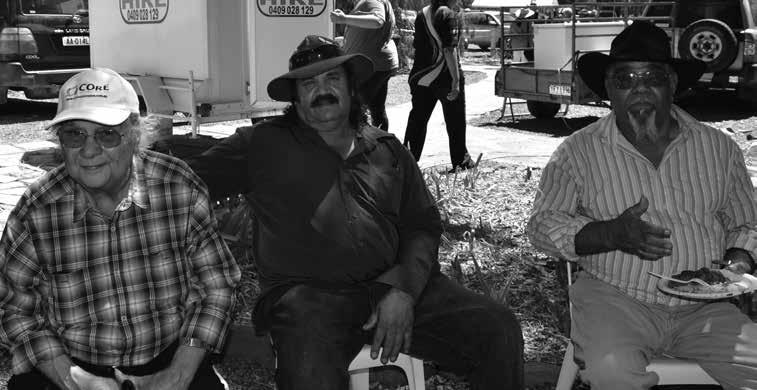
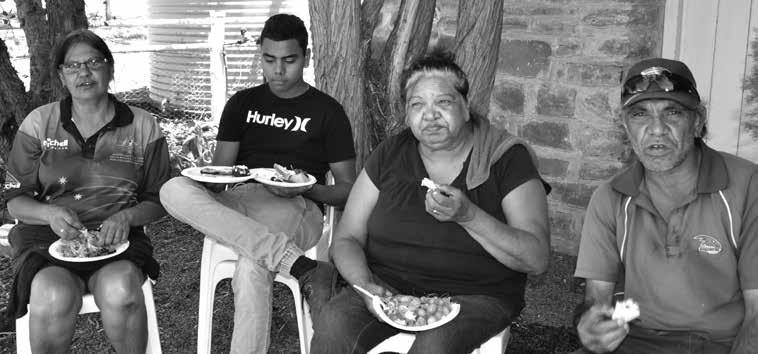


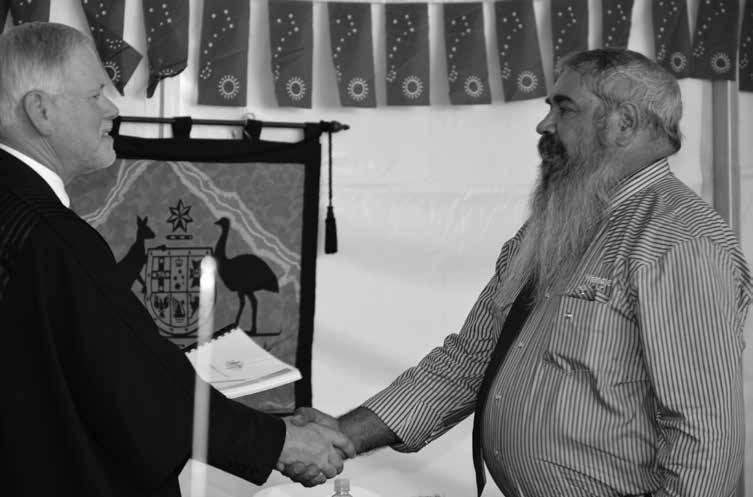
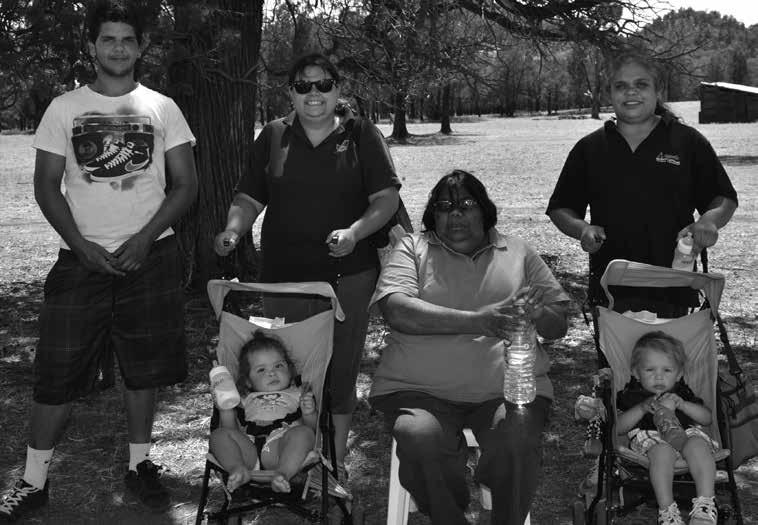
Clockwise from top left: Mark McKenzie Snr, Terrence Coulthard and Roy Coulthard; Justice White and Vincent Coulthard; Todd Irlam, Rell McKenzie, Dolcie Wilton, Karmy Coulthard and twins, Ruby and Eli Johnson; Pauline and Diedre McKenzie; Megan Blight, Ronald Coulthard and Bronte Abrahams; Sue Coulthard, Shayden Rigney Coulthard, Marlene Coulthard and Devon Barnes.

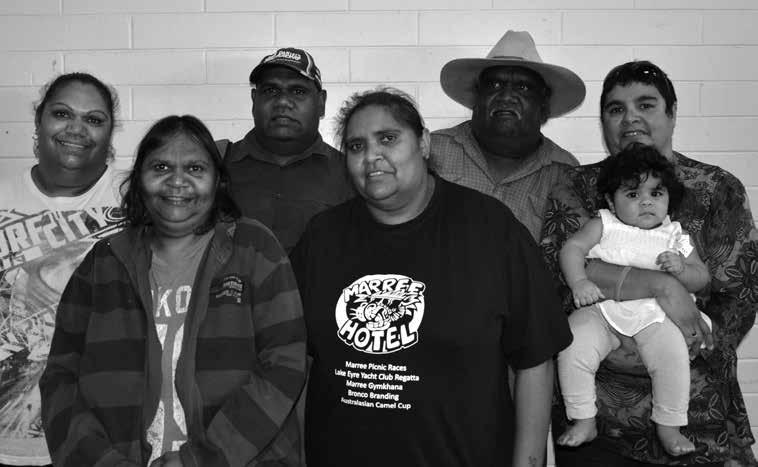
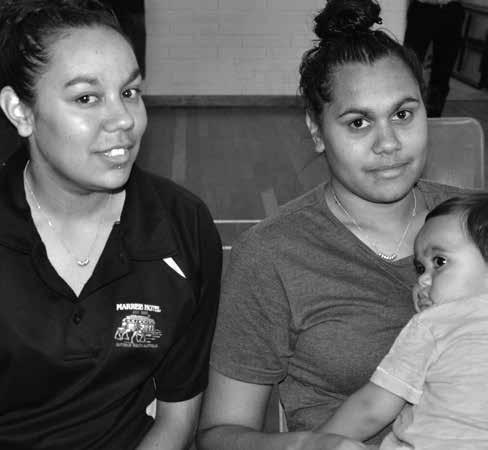




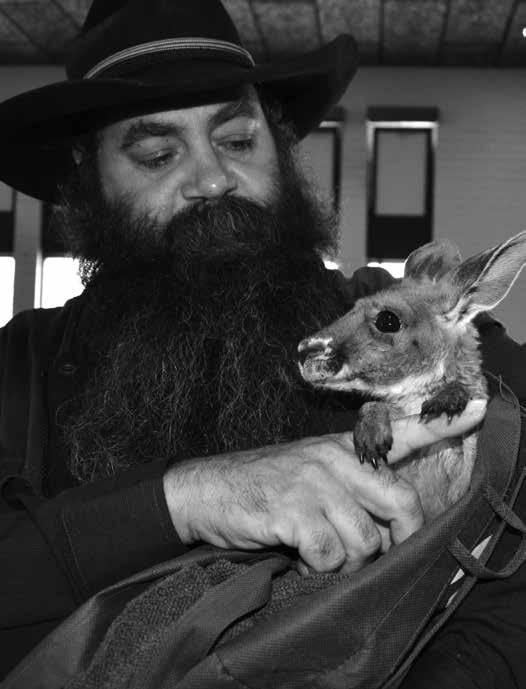

From top, left to right: Willie Dawson, Chris Matthews and Kerrie Standley; Keryn Wiseman, Sophie Gepp, Andy Naylom, Brenda Naylon, Jeffry Naylon, Leeanne Warren and Hailie Strangways Coutlhard; Bianca Dodd and Tamara Jharral Warren; Alice Lander, Betty Stewart and Mavis Dadleh; Keran Stewart; Dieri native title holders and observers; Federal Court in session; Willie Dawson and Fattie the Kangaroo; Leeann Adams and Laurel Dodd.

